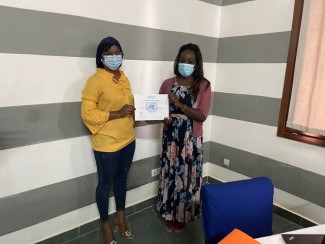UNODC supports people suffering from mental health (including drug use) disorders through civil society training in Senegal

Mental disorders have become a global public health issue exacerbated by the ongoing COVID-19 pandemic. In Senegal, the treatment and care of people suffering from mental health disorders, including substance use disorders, faces multiple obstacles and challenges which have a profound effect on families and communities.
As a result, in 2019, the Ministry of Health of Senegal put in place a network of over 30 organizations throughout the country whose objective is to assist and provide support to individuals struggling with mental health disorders including those who use drugs, who are affected by drug use disorders and/or are living with HIV.
In December 2020, UNODC with the funds obtained by the Joint United Nations Team on Health and HIV/AIDS supported the Mental Health Division of the Ministry of Health in providing training to 14 focal points of REPOSAMS the network of organizations promoting mental health in Senegal. During the 3-day training from 15-17 December 2020, the participants were able to identify and discuss at length the many challenges they face when providing support in their respective regions and communities and jointly thought about solutions.
Amongst the difficulties shared by all regions were:
- the stigmatization people suffering from mental health, including drug use disorders experience;
- the absence of training of community actors working in mental health;
- the lack of integration of mental health into the general health system of the country (universal care coverage);
- the absence of support and facilities in many of the regions in Senegal.
To meet the multifaceted challenges, the Mental Health Division of the Ministry of Health of Senegal is developing a reporting system that could be used by community actors in the field and that would serve as an advocacy tool showing the depth of the challenges surrounding mental health disorders in Senegal.
During the 3-day training, the participants learnt about evidence-based methods and techniques of management and support of mental health disorders including drug use disorders. They were able to develop a preliminary list of questions and data REPOSAMS would be able to collect when working in their local communities. At the end of the training a draft roadmap was agreed upon highlighting the data elements possible and needed to be integrated in the existent health system database of Senegal, the challenges facing the REPOSAMS, the possibilities of putting in place an inter-ministerial committee that would illustrate the multifaceted problem surrounding mental health disorders in Senegal.
Mental disorders have become a global public health issue exacerbated by the ongoing COVID-19 pandemic. In Senegal, the treatment and care of people suffering from mental health disorders, including mental health disorders, faces multiple obstacles and challenges which have a profound effect on families and communities.
As a result, in 2019, the Ministry of Health of Senegal put in place a network of over 30 organizations throughout the country whose objective is to assist and provide support to individuals struggling with mental health disorders including those who use drugs, who are affected by drug use disorders and/or are living with HIV.
In December 2020, UNODC with the funds obtained by the Joint United Nations Team on Health and HIV/AIDS supported the Mental Health Division of the Ministry of Health in providing training to 14 focal points of REPOSAMS the network of organizations promoting mental health in Senegal. During the 3-day training from 15-17 December 2020, the participants were able to identify and discuss at length the many challenges they face when providing support in their respective regions and communities and jointly thought about solutions.
Amongst the difficulties shared by all regions were:
· the stigmatization people suffering from mental health, including drug use disorders experience;
· the absence of training of community actors working in mental health;
· the lack of integration of mental health into the general health system of the country (universal care coverage);
· the absence of support and facilities in many of the regions in Senegal.
To meet the multifaceted challenges, the Mental Health Division of the Ministry of Health of Senegal is developing a reporting system that could be used by community actors in the field and that would serve as an advocacy tool showing the depth of the challenges surrounding mental health disorders in Senegal.
During the 3-day training, the participants learnt about evidence-based methods and techniques of management and support of mental health disorders including drug use disorders. They were able to develop a preliminary list of questions and data REPOSAMS would be able to collect when working in their local communities. At the end of the training a draft roadmap was agreed upon highlighting the data elements possible and needed to be integrated in the existent health system database of Senegal, the challenges facing the REPOSAMS, the possibilities of putting in place an inter-ministerial committee that would illustrate the multifaceted problem surrounding mental health disorders in Senegal.
